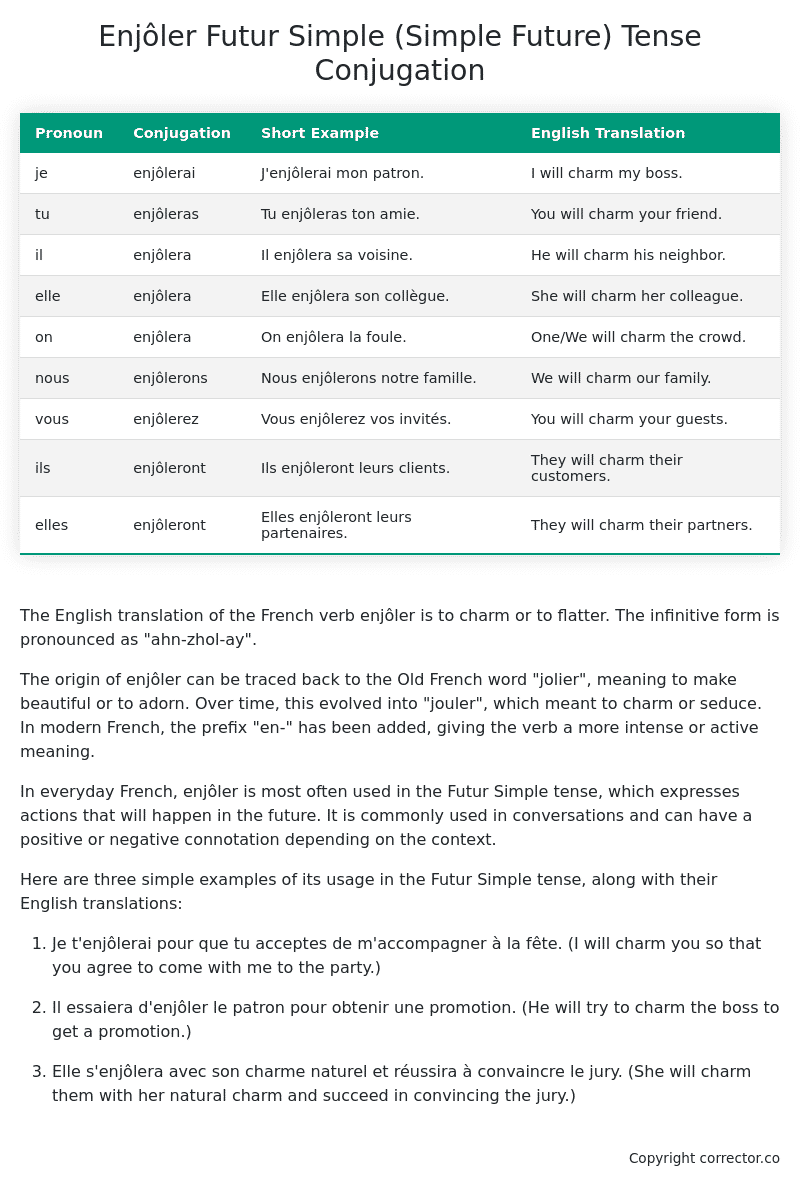Futur Simple (Simple Future) Tense Conjugation of the French Verb enjôler
Introduction to the verb enjôler
The English translation of the French verb enjôler is to charm or to flatter. The infinitive form is pronounced as “ahn-zhol-ay”.
The origin of enjôler can be traced back to the Old French word “jolier”, meaning to make beautiful or to adorn. Over time, this evolved into “jouler”, which meant to charm or seduce. In modern French, the prefix “en-” has been added, giving the verb a more intense or active meaning.
In everyday French, enjôler is most often used in the Futur Simple tense, which expresses actions that will happen in the future. It is commonly used in conversations and can have a positive or negative connotation depending on the context.
Here are three simple examples of its usage in the Futur Simple tense, along with their English translations:
-
Je t’enjôlerai pour que tu acceptes de m’accompagner à la fête. (I will charm you so that you agree to come with me to the party.)
-
Il essaiera d’enjôler le patron pour obtenir une promotion. (He will try to charm the boss to get a promotion.)
-
Elle s’enjôlera avec son charme naturel et réussira à convaincre le jury. (She will charm them with her natural charm and succeed in convincing the jury.)
Table of the Futur Simple (Simple Future) Tense Conjugation of enjôler
| Pronoun | Conjugation | Short Example | English Translation |
|---|---|---|---|
| je | enjôlerai | J’enjôlerai mon patron. | I will charm my boss. |
| tu | enjôleras | Tu enjôleras ton amie. | You will charm your friend. |
| il | enjôlera | Il enjôlera sa voisine. | He will charm his neighbor. |
| elle | enjôlera | Elle enjôlera son collègue. | She will charm her colleague. |
| on | enjôlera | On enjôlera la foule. | One/We will charm the crowd. |
| nous | enjôlerons | Nous enjôlerons notre famille. | We will charm our family. |
| vous | enjôlerez | Vous enjôlerez vos invités. | You will charm your guests. |
| ils | enjôleront | Ils enjôleront leurs clients. | They will charm their customers. |
| elles | enjôleront | Elles enjôleront leurs partenaires. | They will charm their partners. |
Other Conjugations for Enjôler.
Le Present (Present Tense) Conjugation of the French Verb enjôler
Imparfait (Imperfect) Tense Conjugation of the French Verb enjôler
Passé Simple (Simple Past) Tense Conjugation of the French Verb enjôler
Passé Composé (Present Perfect) Tense Conjugation of the French Verb enjôler
Futur Simple (Simple Future) Tense Conjugation of the French Verb enjôler (this article)
Futur Proche (Near Future) Tense Conjugation of the French Verb enjôler
Plus-que-parfait (Pluperfect) Tense Conjugation of the French Verb enjôler
Passé Antérieur (Past Anterior) Tense Conjugation of the French Verb enjôler
Futur Antérieur (Future Anterior) Tense Conjugation of the French Verb enjôler
Subjonctif Présent (Subjunctive Present) Tense Conjugation of the French Verb enjôler
Subjonctif Passé (Subjunctive Past) Tense Conjugation of the French Verb enjôler
Subjonctif Imparfait (Subjunctive Imperfect) Tense Conjugation of the French Verb enjôler
Subjonctif Plus-que-parfait (Subjunctive Pluperfect) Tense Conjugation of the French Verb enjôler
Conditionnel Présent (Conditional Present) Tense Conjugation of the French Verb enjôler
Conditionnel Passé (Conditional Past) Tense Conjugation of the French Verb enjôler
L’impératif Présent (Imperative Present) Tense Conjugation of the French Verb enjôler
L’infinitif Présent (Infinitive Present) Tense Conjugation of the French Verb enjôler
Struggling with French verbs or the language in general? Why not use our free French Grammar Checker – no registration required!
Get a FREE Download Study Sheet of this Conjugation 🔥
Simply right click the image below, click “save image” and get your free reference for the enjôler Futur Simple tense conjugation!

Enjôler – About the French Futur Simple (Simple Future) Tense
Formation of Futur Simple
For regular -er verbs (e.g., parler – to speak)
For regular -ir verbs (e.g., finir – to finish)
For regular -re verbs (e.g., vendre – to sell)
Common Everyday Usage Patterns
Conditional Statements
Interactions with Other Tenses
Futur Antérieur
Conditional
Present
Summary
I hope you enjoyed this article on the verb enjôler. Still in a learning mood? Check out another TOTALLY random French verb conjugation!


